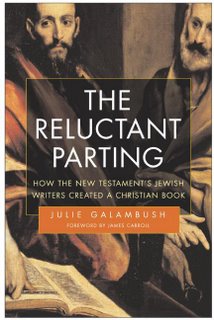 Veteran religion writer Richard Ostling offers an insight into the debate between evangelicals and liberals over the nature of the Gospel. His account about an American Baptist minister, Julie Galambush who converted to Reform Judaism, gives evidence of the way in which doubts about core Christian convictions can lead to repudiation of Christianity itself. Are articulate left-of-center American Baptists really all that different from intelligent proponents of non-Christian faiths, Reform Judaism for example?
Veteran religion writer Richard Ostling offers an insight into the debate between evangelicals and liberals over the nature of the Gospel. His account about an American Baptist minister, Julie Galambush who converted to Reform Judaism, gives evidence of the way in which doubts about core Christian convictions can lead to repudiation of Christianity itself. Are articulate left-of-center American Baptists really all that different from intelligent proponents of non-Christian faiths, Reform Judaism for example? As ex-Christian, Jewish author gives a rare look at faiths' split
The Lowell Sun, 2/18/06
By RICHARD N. OSTLING
AP Religion Writer
Julie Galambush brings a rare background to the often delicate topic of Jewish-Christian relations and her special interest in the first-century split between the two faiths.
She was an American Baptist Churches minister and teacher at the Lutherans' St. Olaf College in Minnesota. Now a convert to Reform Judaism who belongs to a temple in Falls Church, Va., she teaches Bible at the College of William and Mary.
Galambush, naturally, doesn't believe in Jesus' divinity. But her main emphasis is that Christians misunderstand what their scriptural writers originally meant to say about Jews.
She develops that case in The Reluctant Parting: How the New Testament's Jewish Writers Created a Christian Book (Harper San Francisco). Her book originated with experimental classes on the New Testament she led at a Maryland synagogue.
The New Testament is "one of the strangest Jewish books ever written," she writes, and one that "most Jews neither own nor read." Yet they should read it, she believes, because it's vital that Jews understand Christianity.
The nutshell paradox: The New Testament has many passages that are sharply critical of Jews, yet it was written mostly by Jews and largely for Jewish readers to teach about a Jewish messiah.
Galambush's theme is that modern Christians -- and most Christians across the centuries -- distort what the critical comments meant because they don't realize that the New Testament was recording an intense debate within the Jewish community.
The really hot dispute, she says, occurred between the two factions of Jews who followed Jesus. One insisted that all the commandments of the Hebrew Bible (or Old Testament) applied to Gentiles who joined the Jesus movement. Others like Paul, and eventually Peter, said Gentile converts could ignore some of those requirements, especially circumcision.
The latter, "liberal" faction won out and its New Testament exponents were writing harsh attacks against fellow Jewish Christians "rather than Jews as a whole," Galambush says.
http://www.lowellsun.com/religion/ci_3524062

1 comment:
I saw this story rattling around..thanks for the insights. It's no surprise she converted to Reform Judaism, which might as well be described as ethnic unitarianism...
Post a Comment